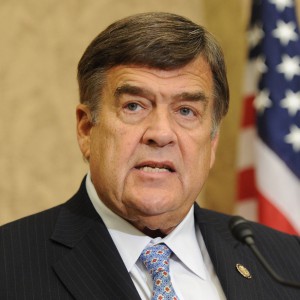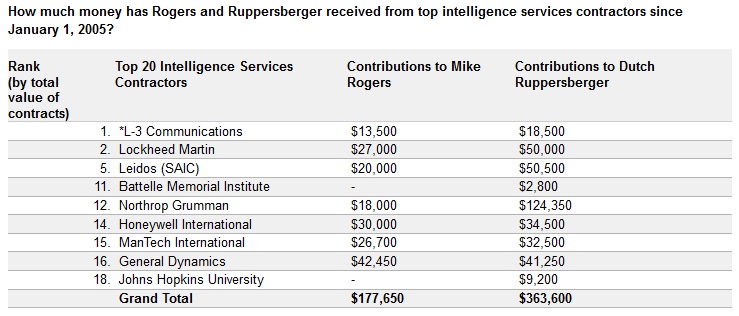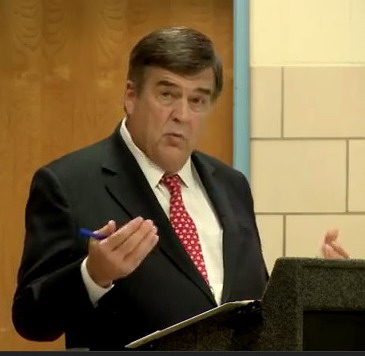Congressman Says He Wants NSA Reforms, But Gets Most Cash From Intel Contractors

UPI FILE
Representative
Dutch Ruppersberger has received more than $363,000 in campaign
contributions from intelligence contractors since 2005.
One of the two representatives pushing a new bill to supposedly rein in America’s overzealous electronic spooks has received more campaign contributions from intelligence contractors than any other member of Congress.
Representative Dutch Ruppersberger (D-Md.) announced he would co-sponsor a bill with House Intelligence Committee Chairman Mike Rodgers (R-Mich.) to end the National Security Agency’s bulk collection of telephone data, but the effort has drawn less-than-enthusiastic reviews from civil liberties watchdogs.
Ruppersberger, whose Congressional district includes the NSA headquarters in Fort Meade, Md., has received more than $363,000 in campaign contributions from intelligence contractors since 2005.
That’s $140,000 more than any other member of Congress, according to a new report from MapLight, a nonprofit that tracks political spending.
He’s working with Rogers, an ardent defender of the American spying regime who first denied, then defended, the existence of NSA spying programs after they were made public in June by Edward Snowden. Since then, he has argued for legislation that would make those activities legal rather than trying to shut them down.
Rogers has received $177,000 from intelligence contractors since 2005, according to MapLight.
It’s no surprise their bill hasn’t received a warm reaction this week.
Though the bill would stop the NSA from collecting bulk telephone records of Americans, it would allow intelligence agencies to access telephone service providers’ records without judicial oversight.
“The bill’s modest improvements to the phone records program are not worth demolishing the important judicial role in overseeing these programs,” said Michelle Richardson, legislative counsel with the American Civil Liberties Union.
Richardson said the bill is using the momentum in favor of reforms to actually expand government power.
Ruppersberger and Rodgers are hardly the only members of Congress to get wads of campaign cash from the companies who make a living off America’s spy programs.
Contractors handed out more than $3.7 million in campaign contributions since 2005 – and that’s just to members of Congress who sit on the House and Senate Intelligence Committees, according to MapLight.
The United States spends more than $52 billion annually on its intelligence budget, according to a Washington Post report. But it’s a “black budget,” meaning the numbers are off-the-record for national security purposes, of course.
As much as 70 percent of the intelligence budget is used to pay private contractors, including the usual suspects like Lockheed Martin, General Dynamics, Northrop Grumman and other companies deeply embedded in the military-industrial complex, according to The Post.
Some of that money ends up finding its way back to the pockets’ of members of the very same committees who are supposed to have Americans’ backs by keeping an eye on the intelligence community.
From 2005 through 2013, members of the House Intelligence Committee got more than $2.1 million from intelligence contractors, while members of the Senate Intelligence Committee hauled in $1.5 million. Contributions were evenly divided between Republicans and Democrats.
Unless those members are willing to bite the hands that feed, it could squash the notion that President Barack Obama’s plans to limit domestic spying will stand a chance of passing Congress.
Simultaneous to the Roders-Rubberberger bill, Obama this week called for ending the NSA program that collects Americans’ phone data in bulk. (??) Phone records would remain with service providers instead of spy agencies and would be kept on file for only 18 months instead of five years (which is how long the NSA keeps them). Spy agencies would need judicial approval before being able to access those records.
(Editor: The Collection of 350 million American's phone conversations is UnConstitutional, not just
access to those illegally acquired wiretaps. Mr. President)
His proposal got better reviews from the ACLU and other pro-reform groups like the Electronic Frontier Foundation, because it keeps judicial oversight as part of the process.
In a statement released through his lawyer, Snowden said the President’s announcement was a “turning point.”
“It marks the beginning of a new effort to reclaim our rights from the NSA and restore the public’s seat at the table of government,” he said.
________________________________________________________________________________
Ruppersberger: Obama made ‘big mistake’ in handling phone surveillance controversy
By Mark Smith in 2013
Congressman Dutch Ruppersberger, ranking Democrat on the House Intelligence Committee, called Edward Joseph Snowden, who recently leaked classified information about the National Security Agency, “a legend in his own mind,” and said President Obama made “a big mistake” in saying he had informed Congress about the surveillance of phone records, when he actually had not.
Ruppersberger’s remarks came during an address Wednesday at the annual meeting of the Fort Meade Alliance, a business group supporting economic activity around Fort Meade, home of NSA.
According to a statement from Obama, “Now, the programs that have been discussed over the last couple of days in the press are secret in the sense that they’re classified, but they’re not secret in the sense that, when it comes to telephone calls, every member of Congress has been briefed on this program. With respect to all these programs, the relevant intelligence committees are fully briefed on these programs.”
Ruppersberger began his remarks at the Hilton BWI Airport by discussing the actions of Snowden, a one-time Arundel High School student and former Booz Allen Hamilton employee.
Ruppersberger said President Obama made “a big mistake” in telling the American people that he apprised “every member of Congress” about the breach. “And he didn’t,” Ruppersberger said. But he said the NSA program is “not going to go away” and that it is a necessary element of protecting U.S. interests.
Other members of Congress had also criticized Obama for his statement.
Ruppersberger spoke to the Fort Meade Alliance audience after an address by the keynote speaker, NSA Director of Installations and Logistics Harvey Davis. Davis spoke in place of the scheduled speaker, NSA Deputy Director Chris Inglis, who was called away on official business.
Mark Smith is editor of the Business Monthly
Congressman Dutch Ruppersberger, ranking Democrat on the House Intelligence Committee, called Edward Joseph Snowden, who recently leaked classified information about the National Security Agency, “a legend in his own mind,” and said President Obama made “a big mistake” in saying he had informed Congress about the surveillance of phone records, when he actually had not.
Ruppersberger’s remarks came during an address Wednesday at the annual meeting of the Fort Meade Alliance, a business group supporting economic activity around Fort Meade, home of NSA.
According to a statement from Obama, “Now, the programs that have been discussed over the last couple of days in the press are secret in the sense that they’re classified, but they’re not secret in the sense that, when it comes to telephone calls, every member of Congress has been briefed on this program. With respect to all these programs, the relevant intelligence committees are fully briefed on these programs.”
Ruppersberger began his remarks at the Hilton BWI Airport by discussing the actions of Snowden, a one-time Arundel High School student and former Booz Allen Hamilton employee.
Ruppersberger said President Obama made “a big mistake” in telling the American people that he apprised “every member of Congress” about the breach. “And he didn’t,” Ruppersberger said. But he said the NSA program is “not going to go away” and that it is a necessary element of protecting U.S. interests.
Other members of Congress had also criticized Obama for his statement.
Ruppersberger spoke to the Fort Meade Alliance audience after an address by the keynote speaker, NSA Director of Installations and Logistics Harvey Davis. Davis spoke in place of the scheduled speaker, NSA Deputy Director Chris Inglis, who was called away on official business.
Mark Smith is editor of the Business Monthly


